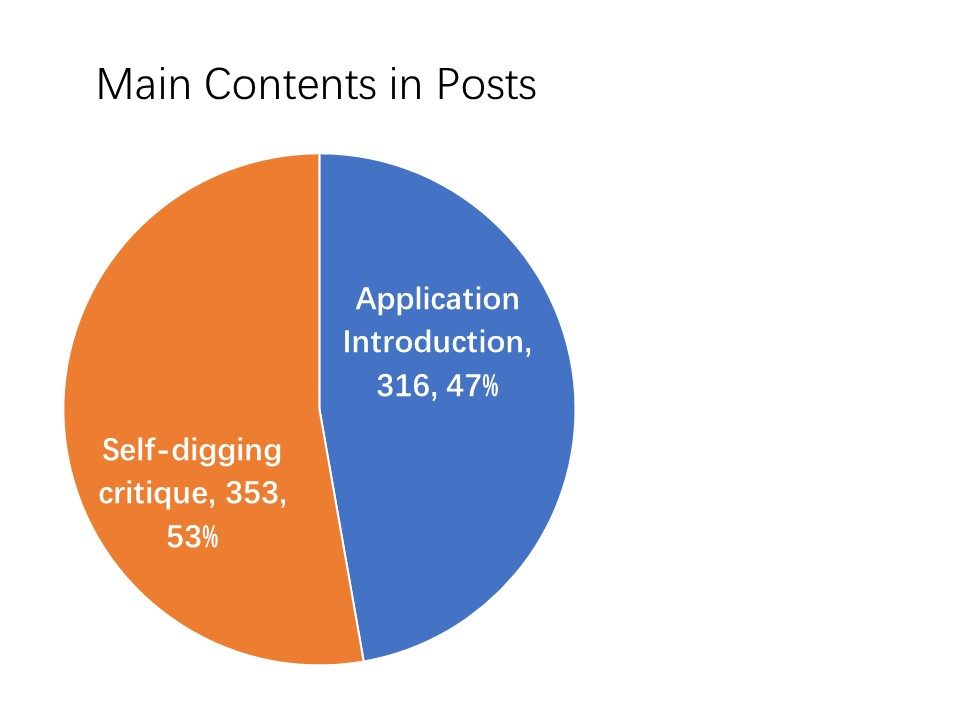I have been thinking about open learning vs mobile learning, which impacts more, although, we all know that the combination makes the final difference. Is technology leading the way of learning or the needs of learning leading the advancement of technology? Am I lost in technology and thus forfeited the core of learning? How do educators position technology in their practice?
I found that the more I explored the more anxious I am, and the more lost I feel in technology. With this anxiety, I read all accessible posts in our ETEC523 and took the liberty to do some statistics by my own definitions. I guess the findings might be interesting to share.
Since I named the categories, I would first explain the categories as below:
- Learning features: the post shows any educational reflections or connections. If any educational reflection is mentioned or summarized in the post, it is categorized as a “learning-related post”. Otherwise, it is categorized as “non-learning related”. Any post that reflects the author’s own learning, such as learning a new APP, rather than thoughts for education to others is categorized as “non-learning related”.
- Main contents in posts: what are the main contents in the posts, introducing a technology/APP/software, or share education-related thoughts or critique. If the content of the post is mainly introducing technology or application without educational critique, it is categorized as “application introduction”. Otherwise, it is categorized as a “self-digging critique”.
I have calculated all 669 posts in Knowledge Mill up to 03Apr, and resulted to below findings:

Amongst 669 posts, 294 or 44% of posts are non-learning-related posts, while 56% of posts are learning-related posts.

Amongst 669 posts, 353 or 53% of posts are self-digging critique posts, while 47% of posts are application introduction posts.
The above little statistic has dawned on me that are we lost in technology? Are we so-called kidnapped by fast-changing technology but forgetting the key needs of education? To put all in a broad horizon, everything could be educational, as long as users are thinking. But, are these the key points?
Wow! Thanks for this, Nini – what a dedicated journey to read through all of our posts.
Part of the rationale for this course is to build better confidence among professional educators in the face of ever-expanding technologies. It is easy to feel overwhelmed, and it is easy to conclude that no individual, or even humanity combined, can comprehend or control that expansion. However, the same is true about the growth of knowledge and complexity in most facets of human existence. The genie that is out of the bottle is not technology, it is humanity. This is scary in all kinds of ways, but concern and constructive action will always be more productive than anxiety, paralysis or withdrawal.
Speaking only for myself, I don’t believe any of our ancestors, in any century or millennium, have ever felt less overwhelmed by environmental factors beyond their control – it is the very nature of survival to attend to such factors and to learn of ways to mitigate their risks. The difference today is that we’ve collectively created almost all of the factors we currently focus on, ironically as byproducts of resolving factors that don’t bother us so much any more. COVID-19 is one example of a non-humanmade factor that should keep us humble.
I don’t think many of you would argue that our capacity to learn, and act knowledgably, is our best survival strategy. Remember that we originally invented language as a technology to augment that learning capacity, and the global ‘fake news’ phenomenon demonstrates that we haven’t nearly harnessed or controlled even the power of words. In a broader sense, education is also a technology we’ve invented to augment learning.
Learning, and learning technologies, need to be agile; our role as educators is fulfill their potential, so we need to be agile as well.